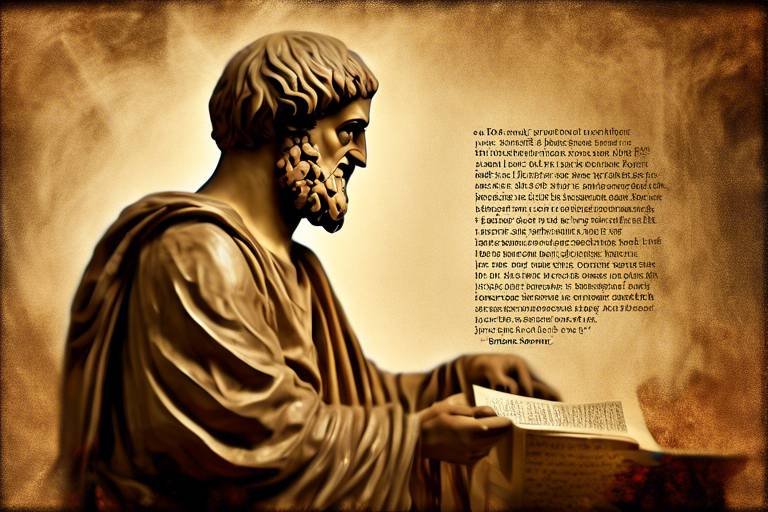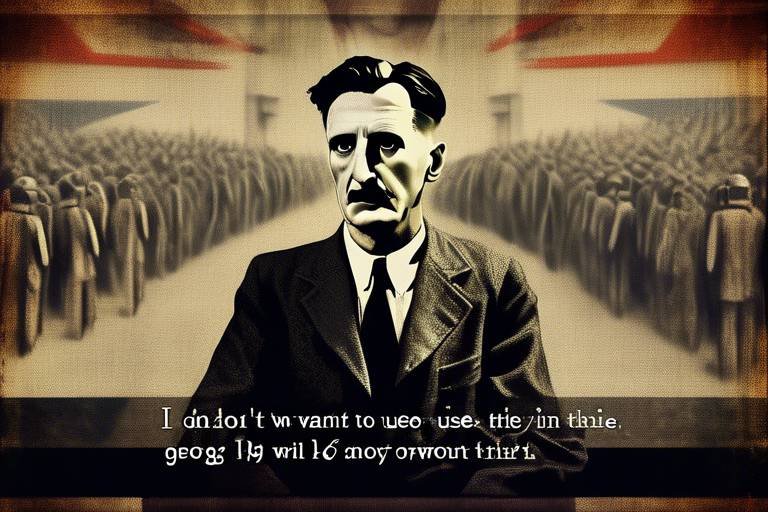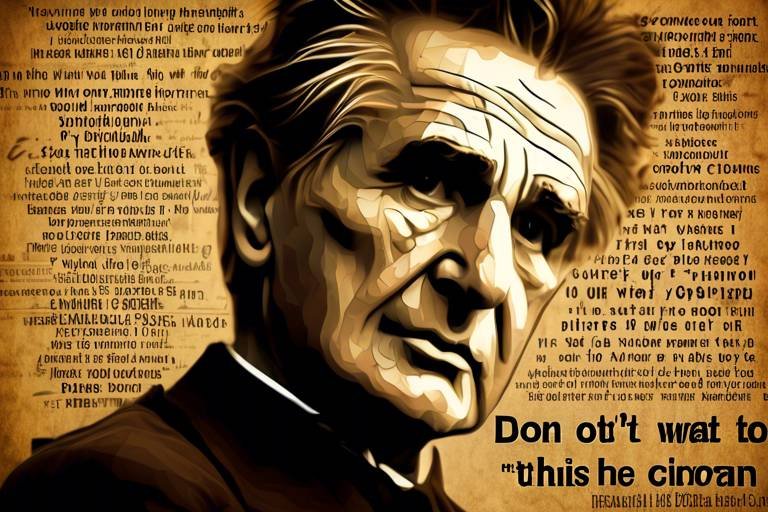Hannah Arendt on Totalitarianism - An Overview
Hannah Arendt, a profound thinker of the 20th century, offers a unique lens through which we can understand the dark phenomenon of totalitarianism. Her insights are not just historical observations; they resonate deeply with the political landscapes we navigate today. In a world where authoritarianism seems to be on the rise, Arendt's work serves as a crucial reminder of the fragility of freedom and the importance of vigilance in protecting democratic values. By dissecting the characteristics, historical context, and implications of totalitarian regimes, we can glean valuable lessons that are as relevant now as they were during her time.
At its core, totalitarianism represents an extreme form of governance where the state seeks to control every facet of life. It's not merely about political power but extends to social, cultural, and even personal realms. Arendt's exploration of this concept invites us to reflect on our own societies and the subtle ways in which power can encroach upon our freedoms. In this article, we'll journey through her key arguments, examining how totalitarianism manifests and the chilling consequences it has on individual autonomy and societal structures.
As we delve into Arendt's analysis, it's essential to recognize the historical backdrop against which her thoughts were formed. The rise of totalitarian regimes in the 20th century, particularly in Nazi Germany and Stalinist Russia, profoundly shaped her theories. These regimes didn't just emerge overnight; they were the result of complex social, economic, and political factors that created fertile ground for such oppressive systems. By understanding this context, we can better appreciate the urgency and relevance of Arendt's warnings about the dangers of unchecked power.
In the following sections, we will explore Arendt's identification of key features of totalitarian regimes, the role of ideology, the mechanisms of surveillance and terror, and the profound impact on individual freedom. We will also discuss her provocative concept of the banality of evil, which challenges our understanding of morality in the face of systemic oppression. Through this exploration, we aim to illuminate the lessons that can be drawn from Arendt's work, helping us to safeguard democracy and human rights in our contemporary society.
- What is totalitarianism? Totalitarianism is a political system where the state recognizes no limits to its authority and seeks to regulate every aspect of public and private life.
- How did Hannah Arendt define totalitarianism? Arendt defined totalitarianism as a distinct political phenomenon characterized by a single-party state, state-controlled propaganda, and the suppression of dissent.
- What is the 'banality of evil'? The 'banality of evil' is a concept introduced by Arendt, suggesting that ordinary people can commit atrocious acts when they become part of a totalitarian system, often without critical thought or moral reflection.
- Why is Arendt's work relevant today? Arendt's insights into totalitarianism serve as a cautionary tale in today's political climate, reminding us to remain vigilant against authoritarian tendencies and to uphold democratic values.

Defining Totalitarianism
Totalitarianism is not just a political term; it embodies a profound transformation of society and governance that can send chills down your spine. Imagine a world where every aspect of your life is monitored, controlled, and dictated by a single entity. This is the essence of totalitarianism, a system that seeks to dominate not only political and economic spheres but also the very fabric of personal existence. Hannah Arendt, a profound thinker of the 20th century, provides a compelling analysis of this phenomenon, offering insights that remain alarmingly relevant today.
At its core, totalitarianism is characterized by absolute power concentrated in the hands of a ruling party or leader. Unlike authoritarian regimes, which may allow some degree of individual freedom, totalitarian systems strive for total control. Arendt highlights several key features that distinguish totalitarianism from other forms of governance:
- Single-Party Rule: Totalitarian regimes operate under a single political party that monopolizes power, effectively eliminating any opposition.
- Propaganda: The state uses propaganda to manipulate public perception, shaping reality to align with its ideology.
- Suppression of Dissent: Any form of opposition is swiftly crushed, often through violent means, ensuring that the regime's narrative remains unchallenged.
- State Control of the Economy: The government exerts control over economic resources, dictating production and distribution to serve its agenda.
Arendt argues that these elements work in concert to create a society where individuals lose their autonomy and are reduced to mere cogs in a vast machine. The implications of such a system are staggering, as it not only stifles freedom but also dehumanizes citizens, stripping them of their individuality and moral agency.
In her analysis, Arendt emphasizes that totalitarianism is not merely a historical artifact but a potential reality that can arise under certain conditions. It thrives in environments marked by social unrest, economic instability, and widespread disillusionment with traditional political structures. This makes it crucial for us to recognize the signs of encroaching totalitarianism in our own societies. By understanding its defining features, we can better equip ourselves to resist and challenge such oppressive systems.

The Historical Context
To truly grasp Hannah Arendt's insights on totalitarianism, it's vital to understand the historical context in which her ideas emerged. The 20th century was a tumultuous period marked by the rise of several totalitarian regimes that fundamentally reshaped the political landscape of nations across the globe. Specifically, the emergence of Nazi Germany under Adolf Hitler and Stalinist Russia under Joseph Stalin served as the backdrop for Arendt's work, profoundly influencing her theories and observations.
In the wake of World War I and the economic devastation that followed, many countries faced a crisis of legitimacy and stability. This instability created fertile ground for totalitarian movements that promised order and unity through absolute control. Arendt's analysis delves deep into how these regimes exploited societal fears and discontent, leveraging them to consolidate power. For instance, the Treaty of Versailles left Germany humiliated and economically crippled, paving the way for extremist ideologies to take root.
Arendt meticulously examined the characteristics of these regimes, noting how they manipulated public sentiment and utilized propaganda to create a narrative that justified their authority. In Nazi Germany, the idea of racial superiority was not just a belief; it became a central tenet that justified horrific atrocities against millions. Similarly, in Stalinist Russia, the promise of a classless society was overshadowed by brutal purges and widespread surveillance.
These regimes didn't just emerge overnight; they were products of their time, fueled by a combination of historical grievances and ideological fervor. Arendt's work prompts us to consider the following key factors that contributed to the rise of totalitarianism:
- Economic Instability: The Great Depression and post-war economic crises created desperation.
- Political Disillusionment: Traditional political structures were seen as ineffective, leading people to seek radical alternatives.
- Social Division: Class struggles and ethnic tensions were exploited to rally support for totalitarian leaders.
In examining these elements, Arendt sheds light on the mechanisms through which ordinary citizens became entangled in the machinery of totalitarianism. Her work serves as a cautionary tale, reminding us that history is not just a series of events but a complex interplay of human actions and ideologies that can lead to both great progress and profound suffering.
As we reflect on Arendt's insights, it's essential to recognize that the lessons from the past are not merely historical footnotes; they are relevant today as we navigate a world where authoritarian tendencies still lurk beneath the surface. The historical context of totalitarianism is not just a chapter in a textbook; it is a reminder of the ongoing struggle between freedom and oppression that defines the human experience.
- What were the main factors that led to the rise of totalitarian regimes in the 20th century?
- How did economic instability contribute to the emergence of totalitarianism?
- What role did propaganda play in maintaining totalitarian control?

Key Features of Totalitarian Regimes
Totalitarian regimes are not just authoritarian; they represent a profound and often chilling transformation of society. Hannah Arendt meticulously outlines several key features that define these oppressive systems. Understanding these characteristics is crucial for recognizing the mechanisms of control that totalitarian governments employ to maintain their grip on power.
At the heart of totalitarianism lies the concept of a single-party state. This means that a single political party monopolizes power, effectively eliminating any opposition. In such a system, political pluralism is not just discouraged; it is actively obliterated. The state controls all political discourse, ensuring that dissenting voices are silenced. This control is often enforced through a combination of propaganda and coercion, creating an environment where the party's ideology is perceived as the only acceptable truth.
Another significant feature is the pervasive use of propaganda. Totalitarian regimes invest heavily in propagating their narratives, using state-controlled media to shape public perception. This propaganda is not merely about promoting the regime; it also involves creating an enemy, often portrayed as a threat to the nation. By doing so, these regimes cultivate a culture of fear and loyalty, compelling citizens to align their beliefs with the state's ideology. The manipulation of information ensures that the populace remains uninformed or misinformed, stifling critical thought and independent reasoning.
Furthermore, the suppression of dissent is a hallmark of totalitarianism. This suppression can take many forms, from censorship and imprisonment to violence and intimidation. The state employs various mechanisms to monitor and control the populace, including the use of secret police and extensive surveillance systems. Citizens are made to feel as though they are always being watched, which instills a sense of paranoia and compliance. In such an environment, expressing dissent becomes not just dangerous but often unthinkable.
Arendt also emphasizes the role of ideology in totalitarian regimes. Ideology serves as a unifying narrative that justifies the regime's actions, no matter how extreme. It provides a framework through which the state can rationalize its policies, often portraying them as necessary for the greater good. This ideological underpinning allows totalitarian governments to manipulate public sentiment and maintain control over the narrative, effectively blurring the lines between right and wrong.
Lastly, the use of surveillance and terror cannot be overstated. Totalitarian regimes often employ a systematic approach to instill fear among their citizens. This can include everything from widespread surveillance to public executions. The goal is to create an atmosphere where people feel they must conform to the state's demands to avoid punishment. Arendt argues that this combination of fear and compliance is essential for sustaining totalitarian rule.
In summary, the key features of totalitarian regimes—single-party dominance, propaganda, suppression of dissent, ideological manipulation, and the use of surveillance and terror—work in concert to create a society where individual freedoms are obliterated. Understanding these characteristics not only provides insight into the nature of totalitarianism but also serves as a cautionary tale for contemporary societies.
- What is totalitarianism? Totalitarianism is a political system where the state holds absolute power and control over all aspects of life, often characterized by a single-party rule, propaganda, and repression of dissent.
- How does propaganda function in totalitarian regimes? Propaganda is used to manipulate public perception, promote the regime's ideology, and create a common enemy, ensuring that dissent is stifled and loyalty is maintained.
- Why is the suppression of dissent critical in totalitarianism? Suppressing dissent is essential for maintaining control, as it prevents opposition and ensures that citizens feel compelled to conform to the state's demands out of fear of repercussions.
- What role does ideology play in totalitarian systems? Ideology serves as the foundation for totalitarian regimes, providing justification for extreme measures and creating a unifying narrative that aligns the populace with the state's goals.

The Role of Ideology
In the realm of totalitarianism, ideology plays a pivotal role, serving as the very backbone that supports and sustains the oppressive structure of such regimes. Hannah Arendt emphasized that ideology is not merely a set of beliefs; it is a comprehensive worldview that provides a unifying narrative for society, often justifying extreme measures to achieve its ends. This narrative is crucial because it creates a sense of purpose and direction, making the often brutal actions of the regime appear not only necessary but also noble in the eyes of the populace.
Arendt argued that totalitarian ideologies are typically marked by a few key characteristics:
- Absolute Certainty: Totalitarian ideologies present their beliefs as undeniable truths, leaving no room for doubt or dissent.
- Historical Determinism: They often claim that history is on their side, suggesting that their rise to power is an inevitable outcome of historical processes.
- Enemy Creation: A common tactic is to identify a scapegoat or enemy, which unites the populace against a common foe, further solidifying the regime's control.
This ideological framework is not just about controlling thoughts but also about shaping behaviors. By embedding these beliefs deeply into the social fabric, totalitarian regimes can manipulate individuals to act against their own interests, often without them even realizing it. This manipulation can lead to a chilling phenomenon where ordinary citizens become agents of the regime, enforcing its rules and norms while justifying their actions through the lens of ideology.
Moreover, ideology serves as a tool for manipulation and control. It creates a reality where the regime's narrative is the only acceptable truth, effectively erasing alternative viewpoints. This systematic suppression of dissent is crucial for maintaining power, as it fosters an environment where questioning the regime becomes synonymous with treason. Arendt's insights remind us that the power of ideology lies in its ability to dehumanize those who oppose it, reducing them to mere obstacles in the path of a greater cause.
In conclusion, the role of ideology in totalitarian systems is profound and multifaceted. It not only provides a justification for the regime's actions but also shapes the very identities of its citizens. Understanding this dynamic is essential for recognizing the dangers posed by totalitarian ideologies in any form, as they continue to threaten individual freedoms and societal integrity.

Surveillance and Terror
In the realm of totalitarianism, surveillance and terror are not just tools; they are the very lifeblood that sustains oppressive regimes. Hannah Arendt argued that these mechanisms are essential for maintaining control and instilling fear among the populace. Imagine living in a world where every move you make is watched, where the shadows seem to whisper your secrets. This constant scrutiny creates an atmosphere of paranoia, compelling individuals to conform to the state's demands, often at the expense of their own freedoms.
Arendt emphasized that totalitarian regimes deploy surveillance in various forms, ranging from overt monitoring by the state to subtler methods that infiltrate daily life. The use of technology, such as cameras and data collection, has evolved, but the fundamental goal remains the same: to keep citizens in line. The pervasive nature of this surveillance leads to a chilling effect on personal expression and dissent, as individuals become acutely aware that their actions are being scrutinized. This leads to a society where people are not only afraid to speak out but also begin to self-censor, limiting their own thoughts and opinions.
Furthermore, terror serves as the other half of this oppressive equation. Totalitarian regimes often employ violent acts—whether through state-sanctioned violence, imprisonment, or even execution—to eliminate any potential threats. The fear of such repercussions looms large, creating a society where obedience is not just encouraged but demanded. Arendt's analysis reveals how this cycle of terror reinforces the regime's power:
| Mechanism | Purpose | Example |
|---|---|---|
| Surveillance | To monitor and control citizens | Use of CCTV cameras in public spaces |
| Terror | To instill fear and compliance | Political purges and executions |
In this way, surveillance and terror create a feedback loop that ensures the regime's longevity. Citizens, conditioned to live in fear, often become complicit in their own oppression. They may even participate in the surveillance of their neighbors, driven by a combination of fear and the desire for self-preservation. This phenomenon highlights a disturbing truth: in totalitarian regimes, the line between victim and perpetrator can blur, leading ordinary people to commit acts they might never have considered in a freer society.
Ultimately, Arendt's insights into surveillance and terror remind us of the fragility of freedom. In our modern world, we must remain vigilant against the encroachment of such practices, as they can seep into our lives in ways we may not immediately recognize. The lessons from Arendt's work urge us to question the balance between security and freedom, prompting us to reflect on how we can protect our rights while resisting the allure of authoritarianism.
- What is the main argument of Hannah Arendt regarding totalitarianism?
Arendt argues that totalitarianism fundamentally undermines individual freedom through mechanisms of surveillance and terror, creating a society of fear and compliance.
- How do surveillance and terror work together in totalitarian regimes?
Surveillance monitors citizens' behavior, while terror enforces compliance through fear, creating a cycle that maintains the regime's power.
- Why is Arendt's concept of the 'banality of evil' significant?
This concept illustrates how ordinary people can become complicit in horrific acts under totalitarian regimes, challenging our understanding of morality and responsibility.
- What can we learn from Arendt's analysis for contemporary society?
Her work prompts us to safeguard democracy and human rights, reminding us to remain vigilant against authoritarian practices that can emerge in modern governance.

The Impact on Individual Freedom
Totalitarianism, as Hannah Arendt articulates, fundamentally disrupts the very essence of individual freedom and autonomy. Imagine living in a world where every thought, action, and belief is meticulously monitored and controlled. In such a reality, the notion of personal agency becomes a mere illusion, overshadowed by the oppressive weight of an all-encompassing regime. Arendt argues that under totalitarian rule, citizens are stripped of their individuality, reduced to mere cogs in a vast machine designed to perpetuate the power of the state.
One of the most striking aspects of totalitarianism is its ability to dehumanize individuals. People are no longer seen as unique beings with their own desires and aspirations; instead, they are categorized and manipulated to serve the interests of the ruling party. This is not just a theoretical concept; it manifests in various ways, such as:
- Suppression of Free Thought: Citizens are coerced into conformity, where dissent is not just frowned upon but actively punished. This creates an environment where people are afraid to express their true opinions, leading to a culture of silence.
- Loss of Privacy: The invasive nature of totalitarian regimes means that personal lives are scrutinized. Surveillance becomes a tool of oppression, making individuals feel as though they are constantly being watched.
- Erasure of Personal Identity: In totalitarian societies, personal identities are often subsumed under collective identities imposed by the state. This erasure leads to a profound sense of alienation and loss of self.
Arendt emphasizes that this systematic dismantling of individual freedom is not merely a consequence of political oppression; it is a deliberate strategy employed by totalitarian regimes to maintain control. By creating a populace that is fearful and compliant, these regimes can effectively quash any potential rebellion before it even begins.
Furthermore, the impact on individual freedom extends beyond the immediate political landscape. It seeps into the fabric of society, altering relationships and eroding trust among individuals. When people are conditioned to betray one another for fear of reprisal, the social bonds that hold communities together begin to fray. This leads to a pervasive atmosphere of suspicion, where personal connections are sacrificed at the altar of survival.
In essence, Arendt's exploration of totalitarianism reveals a chilling truth: the quest for absolute power comes at a grave cost to humanity itself. The implications of her analysis serve as a stark reminder of the fragility of freedom and the urgent need to safeguard it against those who would seek to undermine it. By understanding the mechanisms of totalitarian control, we can better appreciate the value of our individual freedoms and the importance of protecting them in our own societies.
- What is totalitarianism? Totalitarianism is a political system characterized by absolute control over all aspects of life, including politics, culture, and personal beliefs.
- How does totalitarianism impact individual freedom? It undermines personal autonomy, dehumanizes individuals, and creates a culture of fear and conformity.
- What is the "banality of evil"? This concept refers to the idea that ordinary people can commit horrific acts when they are complicit in a totalitarian system, often without questioning the morality of their actions.
- Why is Arendt's work still relevant today? Her insights into totalitarianism provide valuable lessons on the importance of safeguarding democracy and human rights in contemporary society.

The Banality of Evil
One of the most provocative and thought-provoking concepts introduced by Hannah Arendt is the notion of the banality of evil. This idea challenges our traditional understanding of morality, suggesting that ordinary people, rather than being inherently evil, can commit horrific acts when placed in the context of a totalitarian regime. Arendt's observations stemmed from her experiences covering the trial of Adolf Eichmann, a key figure in the Nazi regime. She noted that Eichmann was not a fanatical monster but rather a bureaucrat who followed orders, illustrating how individuals can become complicit in evil through a lack of critical thinking and moral reflection.
Arendt's exploration of the banality of evil raises important questions about human nature and responsibility. It forces us to confront the uncomfortable truth that many individuals may act against their own moral compass when they feel detached from the consequences of their actions. In a totalitarian state, where the lines between right and wrong are often blurred, individuals may justify their participation in atrocities as mere compliance with authority. This phenomenon leads us to ponder: How many of us would act differently if we were faced with similar circumstances?
To illustrate this concept further, consider the following points that encapsulate the banality of evil:
- Normalization of Atrocities: In totalitarian regimes, horrific actions can become normalized, making it easier for individuals to participate without questioning their morality.
- Dehumanization: The regime often dehumanizes its victims, making it psychologically easier for ordinary people to commit acts of violence against them.
- Obedience to Authority: The pressure to conform and obey authority figures can lead individuals to act against their moral beliefs.
Arendt's insights compel us to reflect on our own societal structures. In a world where authoritarianism is on the rise, her concept of the banality of evil serves as a warning. It reminds us that vigilance is essential; we must actively engage our critical faculties and resist the temptation to blindly follow orders. This is not only a lesson from the past but a crucial guideline for safeguarding our democratic values and human rights in the present.
Furthermore, understanding the banality of evil helps us to recognize the importance of individual responsibility. Each person has the power to question authority and to stand up against injustices, even when it may seem easier to remain silent or compliant. Arendt's work encourages us to cultivate a sense of moral agency, urging us to ask ourselves: What would I do in such a situation? By fostering a culture of critical thinking and ethical reflection, we can work towards ensuring that the atrocities of the past are never repeated.
- What does Arendt mean by the "banality of evil"?
Arendt suggests that evil acts can be committed by ordinary people who fail to think critically about their actions, especially in totalitarian regimes. - How does this concept apply to modern society?
The banality of evil serves as a warning against complacency and blind obedience to authority, highlighting the need for vigilance in protecting democratic values. - Can ordinary people really commit evil acts?
Yes, Arendt's analysis shows that under certain conditions, like authoritarianism, ordinary individuals can become complicit in horrific actions.

banality of evil,
One of Arendt's most provocative concepts is the banality of evil, which suggests that ordinary people can commit horrific acts under totalitarian regimes. This idea challenges the traditional notion that evil is always perpetrated by monstrous individuals or fanatics. Instead, Arendt posits that it is often the result of mundane, bureaucratic processes and the complacency of average citizens. Imagine a cog in a machine; each individual may not see the entire mechanism at work, yet their small actions contribute to a larger, more terrifying outcome. This perspective forces us to confront uncomfortable truths about human nature and our capacity for complicity in systems of oppression.
Arendt's exploration of the banality of evil was significantly influenced by her observations during the trial of Adolf Eichmann, a key figure in the Nazi regime responsible for orchestrating the logistics of the Holocaust. Eichmann was not the embodiment of evil as one might expect; rather, he appeared as a rather unremarkable bureaucrat, more concerned with following orders and advancing his career than with the moral implications of his actions. This raises a critical question: how do we reconcile the image of an ordinary person with the capacity for such extraordinary evil? Arendt suggests that it is precisely this ordinariness that makes the phenomenon of evil so chilling.
To further illustrate this concept, consider the following aspects that contribute to the banality of evil:
- Conformity: Many individuals may simply go along with the crowd, prioritizing social acceptance over moral judgment.
- Obedience to Authority: People often feel compelled to obey orders from authority figures, even when those orders conflict with their personal ethics.
- Desensitization: Repeated exposure to violence and injustice can numb individuals to the suffering of others, making it easier to ignore or justify immoral actions.
Arendt’s insights compel us to reflect on our own roles within societal structures. Are we, too, at risk of becoming complicit in systems that perpetuate injustice? This reflection is particularly urgent in today's world, where authoritarianism can rear its head in various forms. The banality of evil serves as a warning that we must remain vigilant and question the status quo, lest we find ourselves unwittingly supporting oppressive regimes.
To understand the banality of evil, we can look at historical examples of individuals who participated in totalitarian systems, often without fully grasping the implications of their actions. For instance, many bureaucrats in Nazi Germany were not fanatical ideologues; they were simply doing their jobs, processing paperwork, and following orders. Their actions, however, contributed to the systematic extermination of millions. This phenomenon is not limited to history; it can be observed in various contexts today, where individuals may participate in harmful practices under the guise of normalcy.
Arendt’s analysis of the banality of evil remains relevant today, prompting us to consider how we engage with authority and the systems around us. It serves as a reminder that we must be proactive in questioning and resisting unjust practices, rather than passively accepting them. By fostering a culture of critical thinking and moral responsibility, we can help safeguard against the rise of totalitarianism and protect democratic values.
- What is the banality of evil? The banality of evil refers to the idea that ordinary individuals can commit atrocious acts simply by conforming to authority and societal norms.
- How does Hannah Arendt illustrate this concept? Arendt illustrated this concept through her observations of Adolf Eichmann, who appeared as a mundane bureaucrat rather than a monstrous figure.
- Why is this concept important today? Understanding the banality of evil is crucial for recognizing our potential complicity in harmful systems and for fostering a culture of accountability and moral responsibility.

which suggests that ordinary people can commit horrific acts under totalitarian regimes. This section delves into this idea and its implications.
This article explores Hannah Arendt's insights on totalitarianism, examining its characteristics, historical context, and implications for modern society. We will delve into her key arguments and their relevance today.
Totalitarianism is a complex political system characterized by absolute power and control over all aspects of life. Arendt's definition highlights its unique features, distinguishing it from other forms of governance.
Understanding the historical backdrop of Arendt's work is essential. This section discusses the rise of totalitarian regimes in the 20th century, focusing on Nazi Germany and Stalinist Russia, which profoundly influenced her theories.
Arendt identifies specific traits that define totalitarian governments, such as a single-party state, propaganda, and the suppression of dissent. This subsection examines how these elements work together to maintain control.
Ideology serves as the backbone of totalitarianism, providing a unifying narrative that justifies extreme measures. This section explores how Arendt viewed ideology as a tool for manipulation and control.
Totalitarian regimes often employ surveillance and terror to instill fear and compliance among citizens. This subsection discusses Arendt's perspective on how these tactics are essential for maintaining power.
Arendt argues that totalitarianism fundamentally undermines individual freedom and autonomy. This section examines her views on how such regimes dehumanize citizens and erase personal agency.
One of Arendt's most provocative concepts is the banality of evil, which suggests that ordinary people can commit horrific acts under totalitarian regimes. This section delves into this idea and its implications.
Arendt's notion of the banality of evil challenges the traditional view that evil acts are only committed by monstrous individuals. Instead, she argues that these acts can be carried out by ordinary individuals who become complicit in the machinery of a totalitarian state. Imagine a cog in a vast, oppressive machine; it might not seem significant on its own, but when multiplied by millions, it can drive the machine to horrific outcomes. This is the essence of her argument: that the bureaucratic, mundane nature of evil can lead to devastating consequences.
For instance, consider the role of ordinary citizens in the Holocaust. Many were not fanatics; they were teachers, shopkeepers, and neighbors who, under the pressure of a totalitarian regime, participated in or turned a blind eye to atrocities. Arendt's analysis reveals that this complicity often stems from a desire to conform, to avoid repercussions, or simply from a lack of critical engagement with the system. The chilling reality is that when individuals prioritize loyalty to the state over moral judgment, they can become agents of evil without ever perceiving themselves as such.
Moreover, this idea raises profound questions about morality and responsibility. Are these individuals guilty of moral failure, or are they victims of a system that dehumanizes both the perpetrators and the victims? Arendt’s insights compel us to reflect on our own societal structures and the potential for ordinary people to become unwitting participants in systems of oppression.
Arendt's analysis of totalitarianism remains relevant today, prompting reflections on modern authoritarianism. This section discusses the lessons we can learn from her work to safeguard democracy and human rights.
- What is totalitarianism? Totalitarianism is a political system where the state holds absolute power, controlling all aspects of life, including the economy, education, and personal beliefs.
- How did Hannah Arendt define the banality of evil? Arendt defined the banality of evil as the phenomenon where ordinary people commit atrocious acts simply by conforming to the demands of a totalitarian regime.
- Why is the historical context important in understanding Arendt's work? The historical context, particularly the rise of Nazi Germany and Stalinist Russia, shaped Arendt's theories and provided concrete examples of totalitarianism in action.
- What lessons can we learn from Arendt's insights today? Arendt's work serves as a cautionary tale about the fragility of democracy and the importance of vigilance against authoritarianism in any form.

Case Studies of Ordinary Perpetrators
When we think of totalitarian regimes, we often envision the leaders and their henchmen carrying out orders with ruthless efficiency. However, one of Hannah Arendt's most striking insights is that the machinery of totalitarianism is not solely powered by the elite; rather, it thrives on the complicity of ordinary individuals. This phenomenon raises unsettling questions: How do seemingly normal people become agents of oppression? What drives them to participate in atrocities? To explore these questions, we can look at several case studies that illustrate the concept of the banality of evil.
One of the most notable examples comes from the Nazi regime during World War II. Take, for instance, the story of a schoolteacher in Germany who, despite his initial reservations, became an enthusiastic supporter of the regime's policies. He began by participating in community meetings where anti-Semitic propaganda was disseminated. Gradually, he found himself justifying the regime's actions, convincing himself that he was merely following orders and that the state knew best. This transformation from an ordinary citizen to a perpetrator illustrates how totalitarian ideologies can seep into everyday life, reshaping morals and ethics.
Another compelling case is that of the Soviet Union under Stalin. Ordinary citizens were often coerced into becoming informants, reporting on their neighbors, friends, or even family members. This culture of fear and suspicion created a chilling effect, where individuals felt compelled to betray one another to avoid being targeted themselves. Arendt's analysis highlights that these informants were not inherently evil; they were often motivated by a desire for self-preservation, demonstrating how totalitarianism can distort human relationships and moral considerations.
Arendt's observations lead us to contemplate the broader implications of these case studies. They challenge us to consider the nature of complicity and the ethical responsibilities that individuals bear in the face of authoritarianism. It’s a sobering reminder that the line between good and evil can blur in the presence of oppressive regimes, and that ordinary people can become unwitting participants in systems of horror.
To further illustrate the patterns of ordinary perpetrators, we can summarize key characteristics observed in these case studies:
| Characteristic | Description |
|---|---|
| Conformity | Individuals often conform to societal norms, even when those norms support oppressive actions. |
| Desensitization | Repeated exposure to propaganda and violence can desensitize individuals, making them more likely to accept inhumane actions. |
| Self-Preservation | The instinct to protect oneself can lead individuals to betray others, prioritizing personal safety over moral considerations. |
| Normalization of Violence | As violence becomes normalized, individuals may rationalize their participation in it as a necessary evil. |
These case studies serve as a stark reminder of the potential for ordinary people to become complicit in systems of oppression. They underscore the importance of vigilance in safeguarding democratic values and human rights, lest we find ourselves in a situation where the ordinary becomes the extraordinary in the realm of evil.
- What is the "banality of evil"? The term refers to the idea that ordinary people can commit horrific acts simply by following orders or conforming to societal norms.
- How can we prevent ordinary people from becoming perpetrators? Education, critical thinking, and fostering a culture of dissent are crucial in preventing complicity in authoritarian regimes.
- What role does propaganda play in totalitarian regimes? Propaganda is used to manipulate public perception, justify oppressive actions, and create a unified narrative that supports the regime's goals.

Lessons for Contemporary Society
Hannah Arendt's insights into totalitarianism are not just relics of the past; they resonate profoundly in our contemporary society. As we navigate through an era where authoritarian tendencies are surfacing globally, her work serves as a crucial reminder of the fragility of democracy and the importance of vigilance. One of the most striking lessons we can glean from Arendt is the need for active participation in our political systems. She believed that apathy and disengagement can pave the way for totalitarian regimes to flourish. In a world where information is readily available, it is our responsibility to stay informed and involved.
Moreover, Arendt's concept of the "banality of evil" challenges us to reflect on our moral compass. It compels us to ask ourselves: How can ordinary individuals become agents of oppression? This question is particularly relevant today as we witness ordinary people, often driven by fear or conformity, enabling systems of injustice. It serves as a stark warning that we must remain vigilant against the normalization of harmful ideologies and practices. To prevent history from repeating itself, we must foster a culture of critical thinking and ethical responsibility.
Another significant lesson lies in the role of ideology. Arendt illustrated how totalitarian regimes manipulate ideology to control populations. Today, we see similar tactics employed through misinformation and propaganda, often spread via social media. It is essential for individuals to develop media literacy skills to discern fact from fiction. Understanding how narratives are constructed can empower citizens to resist manipulation and advocate for truth.
Furthermore, Arendt's emphasis on the importance of individual freedom and autonomy reminds us of the need to protect these values in our societies. The erosion of personal liberties can happen gradually, often under the guise of security or social order. We must remain vigilant against policies that infringe on our rights, ensuring that we hold our leaders accountable. This requires a robust civil society where dissent is not only tolerated but encouraged as a means of safeguarding democracy.
In conclusion, the lessons from Arendt's analysis of totalitarianism are invaluable as we confront the challenges of our time. By engaging actively in our democracies, questioning the narratives we encounter, and protecting individual freedoms, we can contribute to a society that values human rights and resists the allure of authoritarianism. The past may inform us, but it is our actions today that will shape the future.
- What is totalitarianism? Totalitarianism is a political system where the state holds absolute power over all aspects of life, often characterized by a single-party rule, propaganda, and suppression of dissent.
- How does Arendt define the "banality of evil"? Arendt's concept of the "banality of evil" suggests that ordinary people can commit horrific acts when they conform to the demands of totalitarian regimes, often without critical reflection on their actions.
- Why is media literacy important in today's society? Media literacy is crucial as it enables individuals to critically evaluate information, discern fact from fiction, and resist manipulation by totalitarian ideologies.
- How can we protect individual freedoms? Protecting individual freedoms requires active engagement in political processes, holding leaders accountable, and fostering a culture that values dissent and critical thought.
Frequently Asked Questions
- What is totalitarianism according to Hannah Arendt?
Totalitarianism, as defined by Hannah Arendt, is a political system characterized by absolute control over all aspects of life. It goes beyond mere authoritarianism by seeking to dominate not only the political sphere but also the social, cultural, and personal lives of individuals. This comprehensive control is maintained through a combination of propaganda, surveillance, and the suppression of dissent.
- How did historical events influence Arendt's views on totalitarianism?
Hannah Arendt's insights were profoundly shaped by the rise of totalitarian regimes in the 20th century, particularly Nazi Germany and Stalinist Russia. These historical contexts provided her with real-world examples of how totalitarian systems operate, allowing her to analyze the mechanisms of power, ideology, and the impact on individual freedoms. Her experiences as a Jewish refugee during World War II also deeply informed her understanding of the dangers posed by totalitarian ideologies.
- What are the key features of totalitarian regimes?
Arendt identifies several defining characteristics of totalitarian regimes, including:
- A single-party state that eliminates political pluralism
- Extensive use of propaganda to control public perception
- Systematic suppression of dissent and opposition
- Use of surveillance and terror to instill fear among citizens
These elements work together to create a society where individual freedoms are severely restricted, and compliance is enforced through fear and manipulation.
- What does Arendt mean by the "banality of evil"?
The "banality of evil" is one of Arendt's most provocative concepts, suggesting that ordinary people can commit horrific acts when they are part of a totalitarian system. This idea challenges the notion that only inherently evil individuals can perpetrate atrocities. Instead, it highlights how bureaucratic systems and the normalization of immoral actions can lead to widespread complicity in evil, often without individuals fully realizing the consequences of their actions.
- How can Arendt's analysis of totalitarianism be applied to contemporary society?
Arendt's work remains relevant today as it prompts us to reflect on the dangers of modern authoritarianism. By understanding the mechanisms of totalitarian control, we can better recognize and resist attempts to undermine democracy and human rights in our own societies. Her insights encourage vigilance against propaganda, the erosion of individual freedoms, and the normalization of fear, reminding us of the importance of safeguarding democratic values.



















